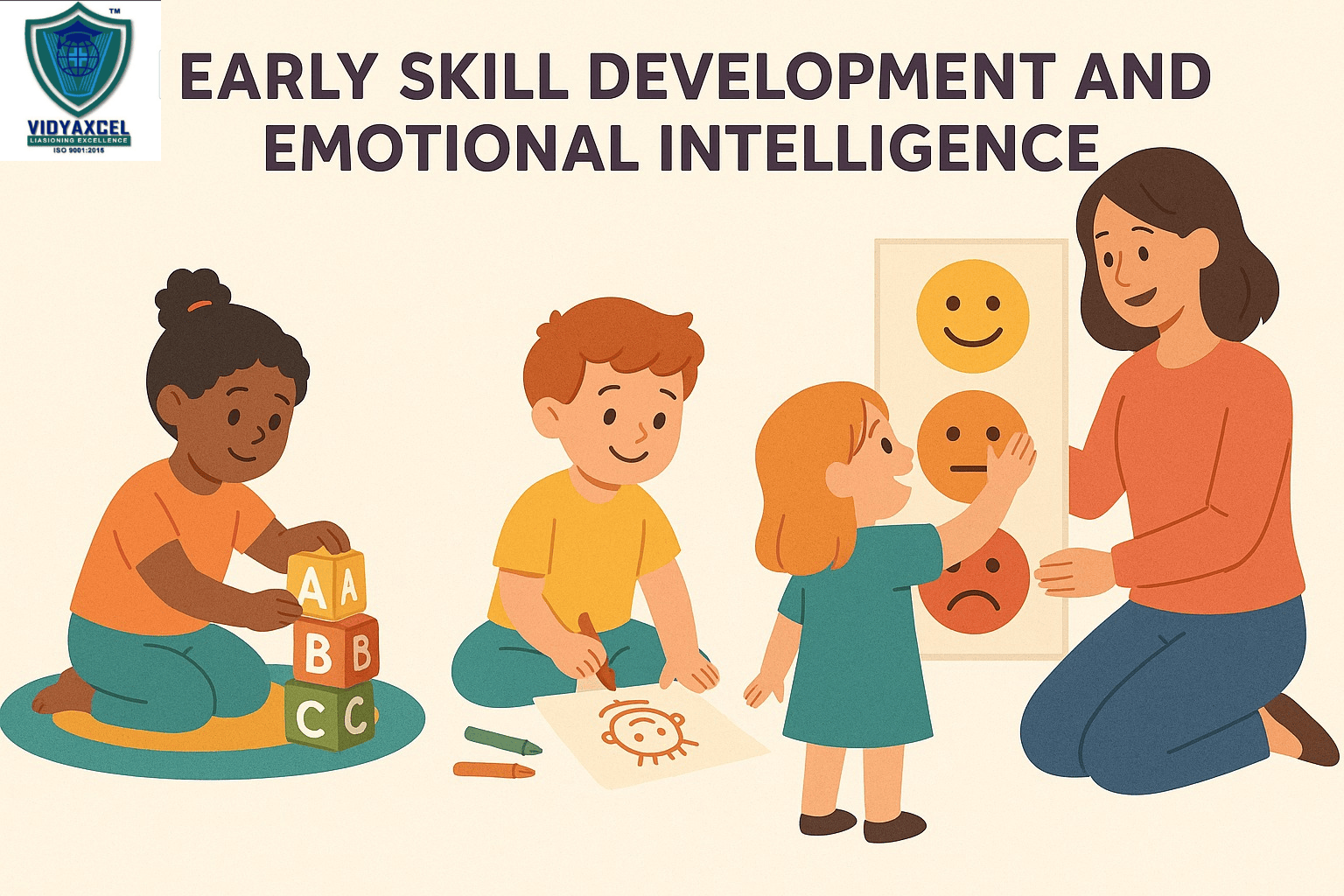Blog Details

18Apr
Early skill development and emotional intelligence
In a fast-changing world where adaptability, creativity, and communication are becoming more valuable than rote knowledge, early childhood has taken on a whole new level of importance. The skills children begin developing in their early years—both cognitive and emotional—form the foundation for how they learn, interact, and eventually, how they navigate careers and relationships as adults. While academic achievement often takes centre stage, it’s the blend of early skill development and emotional intelligence (EQ) that truly prepares children for a successful, balanced, and fulfilling life. As parents and caregivers, understanding and nurturing these abilities from the start can give your child a powerful head starts in both school and life.
🧠 What Is Early Skill Development?
Early skill development refers to the process of nurturing foundational abilities in children during their formative years (ages 2–10). These include:
✔️ Cognitive Skills
- Problem-solving
- Critical thinking
- Attention and memory
- Language and communication
✔️ Motor Skills
- Fine motor (writing, drawing, using tools)
- Gross motor (running, jumping, coordination)
✔️ Creative & Analytical Skills
- Curiosity
- Imagination
- Pattern recognition
- STEM-oriented thinking (math, logic, coding)
These core abilities are often developed through play, storytelling, games, and hands-on activities. The earlier they're nurtured, the easier it is for kids to build on them later in school and life.
💖 What Is Emotional Intelligence (EQ)?
Emotional intelligence is the ability to understand, manage, and express one’s emotions while recognizing and influencing the emotions of others.
It includes:
- Self-awareness – Knowing your emotions and how they affect thoughts and behaviour.
- Self-regulation – Managing impulsive feelings and behaviours, adapting to changing situations.
- Motivation – Setting and achieving goals.
- Empathy – Understanding others' emotions.
- Social skills – Building healthy relationships and resolving conflicts effectively.
🎯 Why Are These Important in Career Development?
✅ Strong EQ = Stronger Leadership, Teamwork & Resilience
Kids with high EQ tend to do better in group settings, manage stress more effectively, and are better leaders and collaborators.
✅ Early Skill Development = Confidence + Competence
When kids practice real-world problem-solving early on (e.g., puzzles, project-based learning), they build confidence in their ability to learn and adapt—key traits for any career.
👨👩👧 How Parents Can Support Early Skill & EQ Development:
📚 1. Encourage Open Dialogue
Let kids name their feelings: “Are you feeling frustrated or sad?” This builds emotional vocabulary and self-awareness.
🎨 2. Provide Creative Freedom
Arts, music, and pretend play build not just creativity but communication and empathy as well.
🧩 3. Choose Smart Toys and Games
Puzzles, logic games, building blocks, and interactive storytelling tools promote cognitive growth.
🧘 4. Model Emotional Regulation
Show your child how you handle stress or disappointment. Kids learn by watching.
📈 5. Praise Effort, Not Just Outcome
This encourages a growth mindset, teaching them that they can improve through effort and learning.
👫 6. Encourage Team Activities
Sports, group projects, and volunteering teach cooperation, patience, and social responsibility.
🌍 EQ and Skills Are the New Superpowers
In today’s unpredictable world, emotional resilience and versatile thinking are more essential than ever. Teaching these early on helps kids:
- Navigate peer pressure and bullying
- Adapt to new academic and social challenges
- Build meaningful relationships
- Choose careers aligned with their passions and personalities
Conclusion
The early years are more than just play—they’re a critical window for shaping how children think, feel, and connect with the world around them. By supporting early skill development alongside emotional intelligence, parents can raise children who are not only smart but also self-aware, compassionate, and resilient. These qualities will stay with them far beyond childhood, influencing how they build relationships, solve problems, and pursue meaningful careers. In a future that demands both intellect and empathy, these early lessons are the seeds of lifelong success.
FAQ’s
What is early skill development, and why is it important?
Early skill development refers to building foundational abilities like problem-solving, communication, creativity, motor skills, and critical thinking in young children (typically ages 2–10). These skills lay the groundwork for lifelong learning, confidence, and adaptability in school, career, and life.
What is emotional intelligence (EQ) in children?
Emotional intelligence is the ability to recognize, understand, manage, and express emotions effectively. In kids, it includes self-awareness, empathy, emotional regulation, and the ability to interact positively with others. EQ plays a big role in forming healthy relationships and handling stress.
When should parents start developing these skills in their children?
It starts as early as toddlerhood. Children begin to understand emotions, imitate behaviour, and explore their environment in their first few years. The earlier you nurture these areas through play, talk, and example, the better the developmental outcomes.
Is screen time bad for emotional or skill development?
Too much passive screen time can reduce opportunities for real-world interaction and active learning. However, educational and interactive content, when used in moderation and guided by parents, can support learning—especially if followed by real-life practice.
Can emotional intelligence be taught at home?
Yes! Parents are the first and most powerful teachers of emotional intelligence. Your daily interactions—how you respond to your child’s emotions, how you express your own, and how you handle stress—are all lessons they absorb and mirror.
Our Office: West Bengal, Maharashtra & Delhi.
For More Infomation about admission in Medical, Engineering, Management & Study in Overseas Details.
View Current Study Overseas, Medical, Engineering & Management Admission Details Video.





